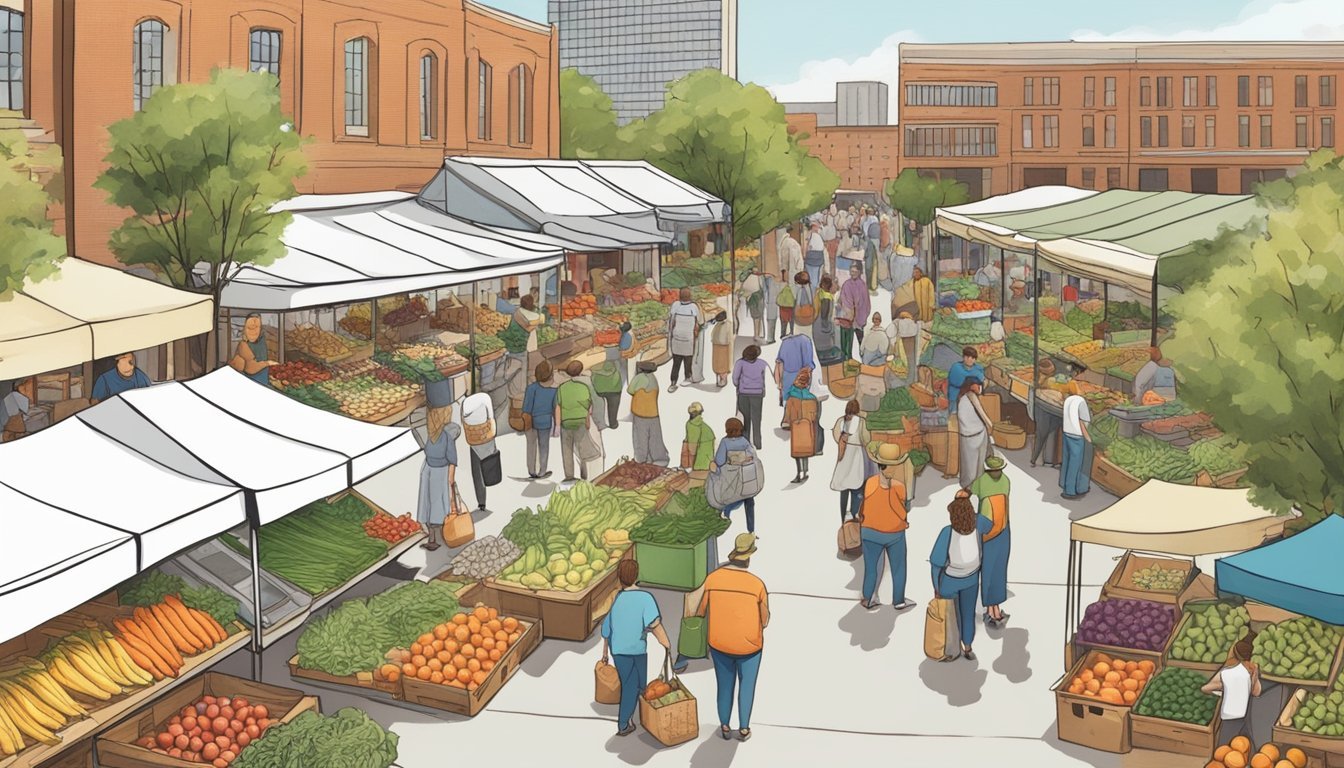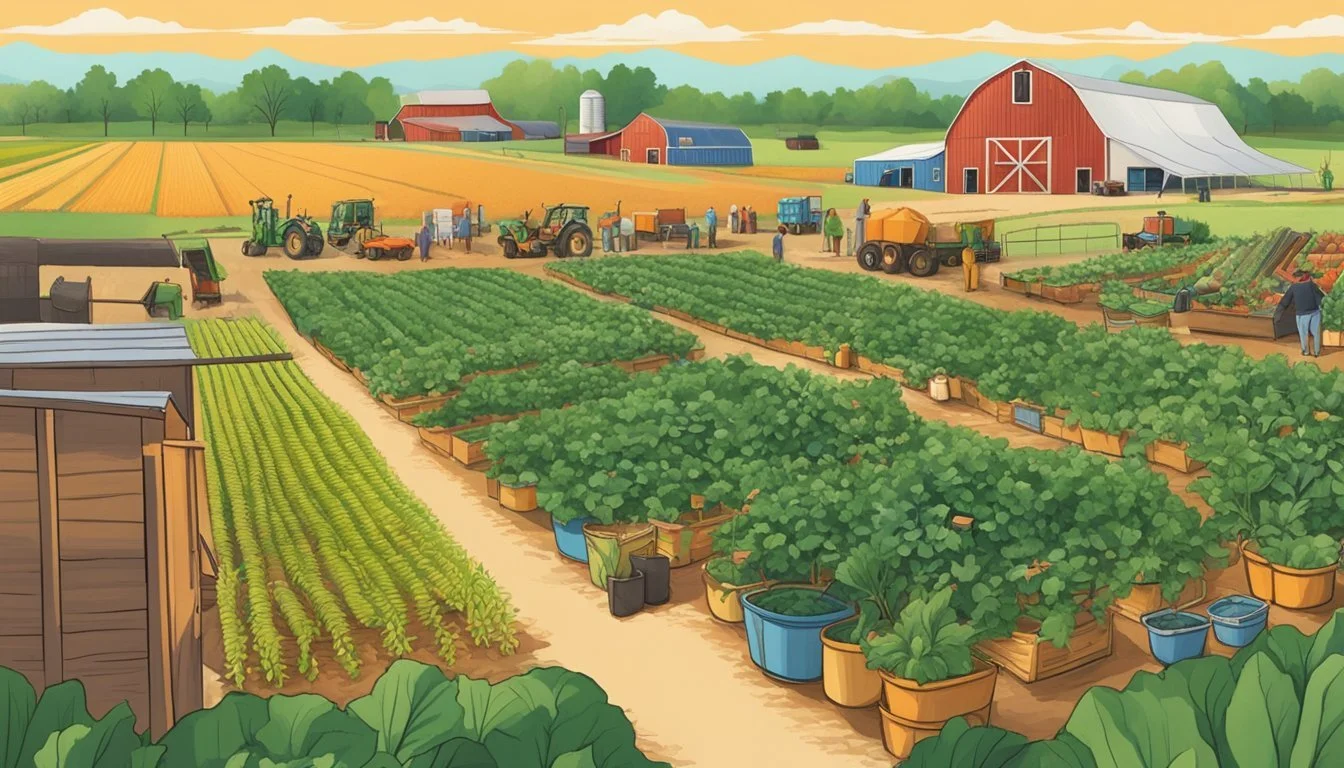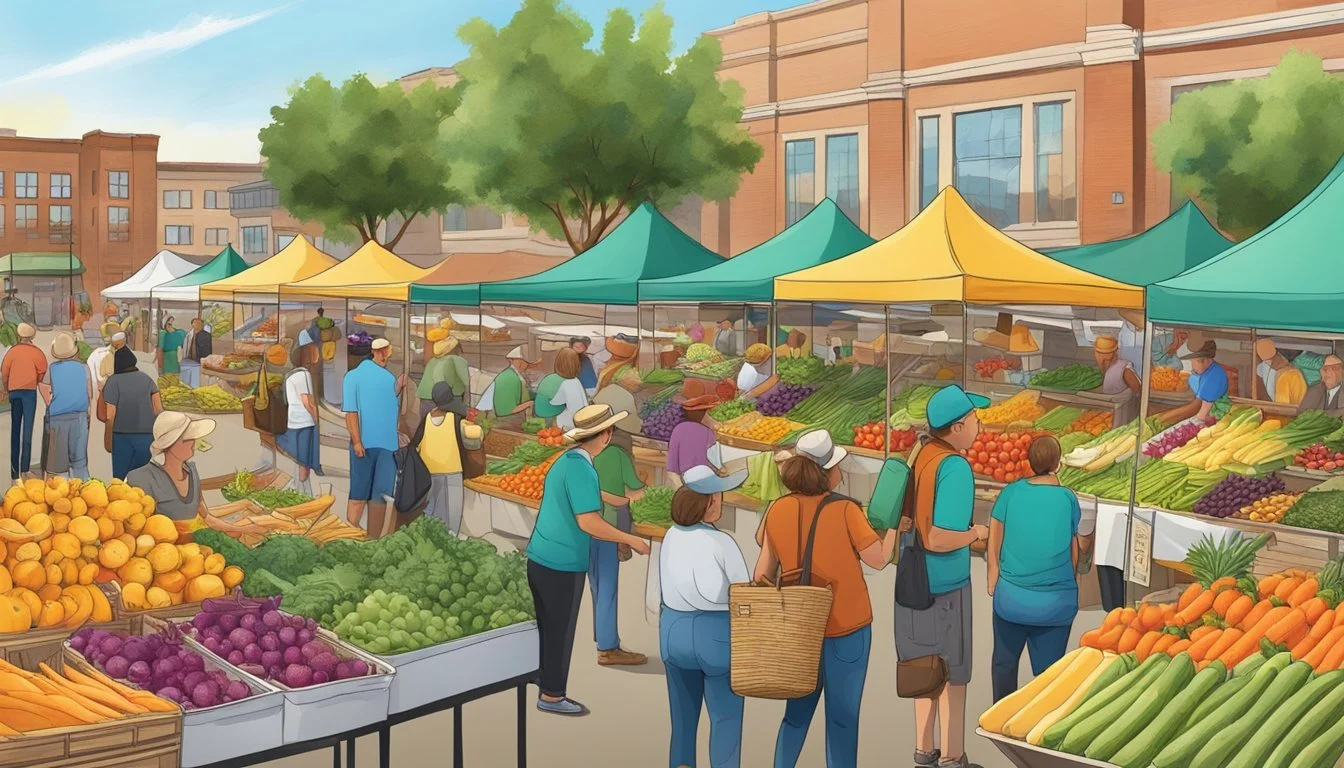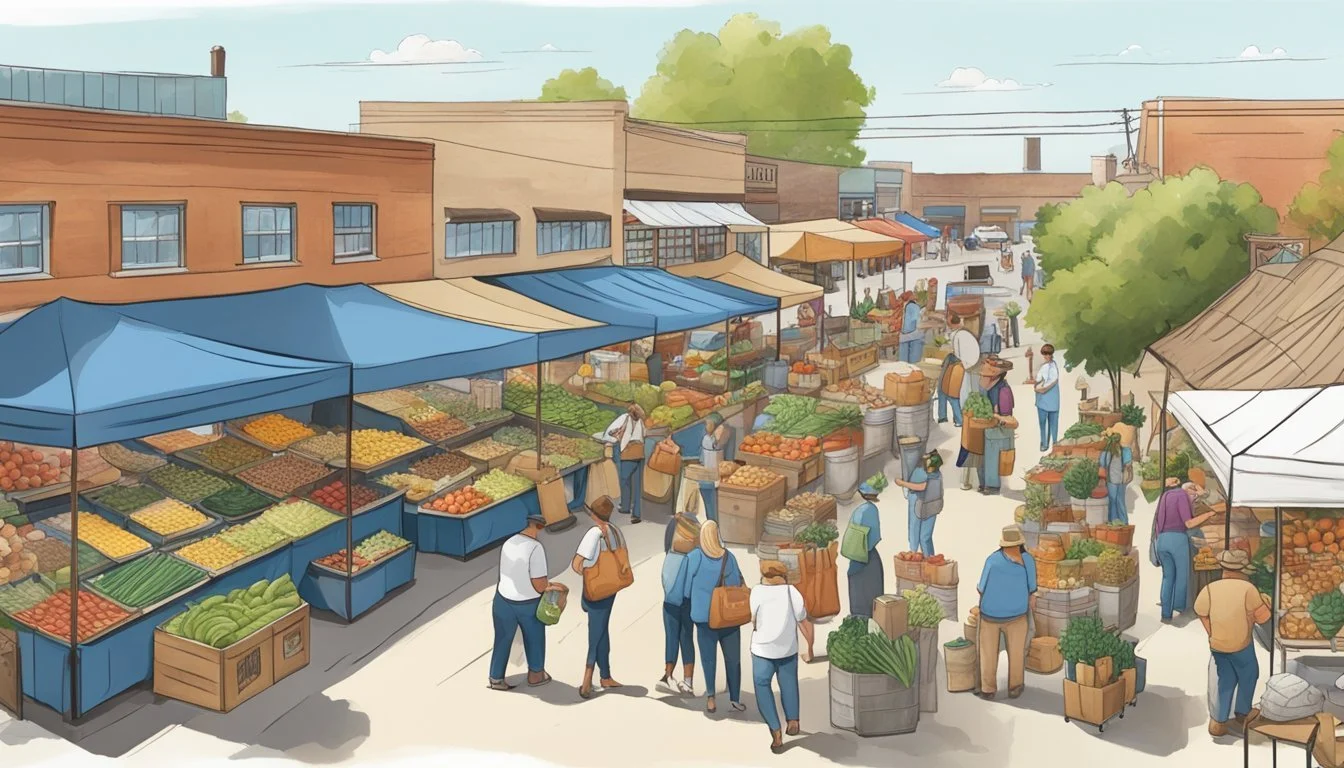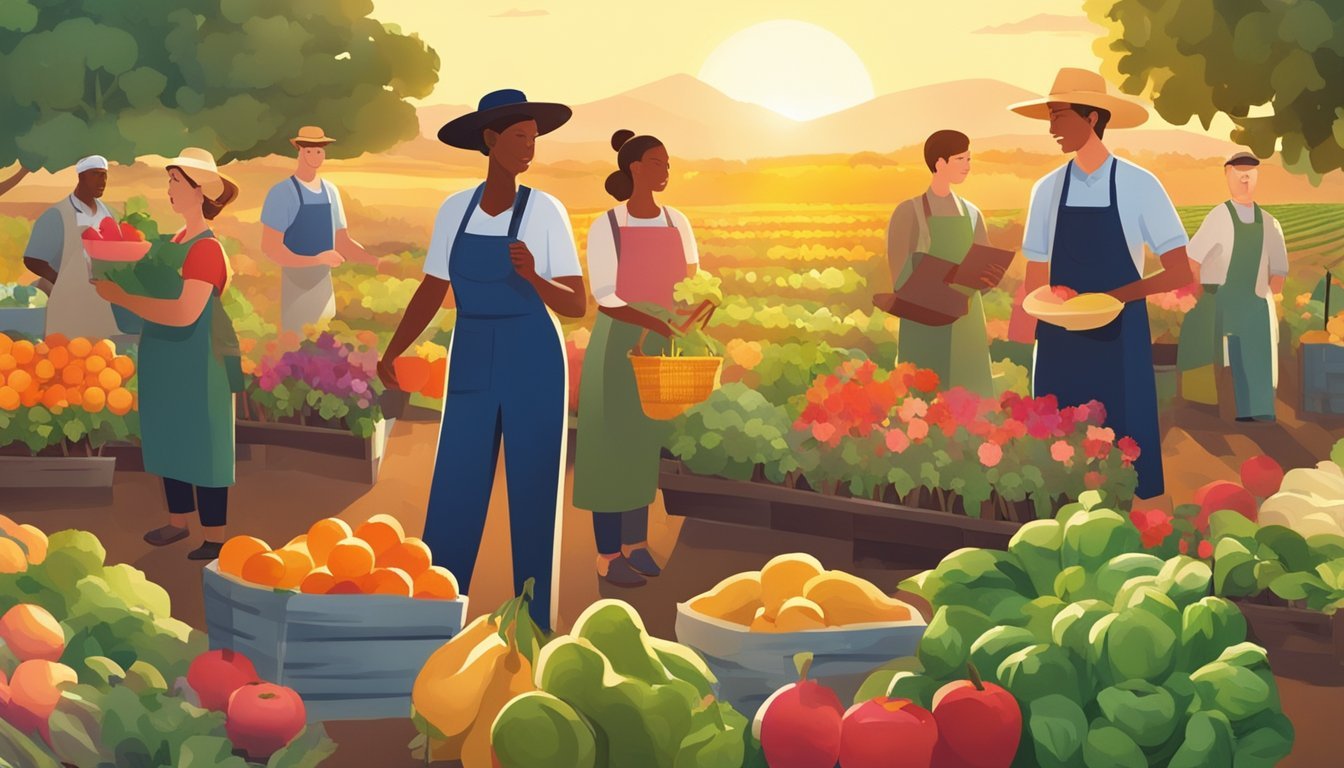Community Supported Agriculture (CSA) in Oklahoma City, OK
A Guide to Local Farm Shares
Community Supported Agriculture, or CSA, has established a strong foothold in Oklahoma City, providing an avenue for residents to engage directly with local farmers and receive fresh, seasonal produce. This model of food distribution connects consumers and farmers in a partnership that is mutually beneficial. Members subscribe by purchasing a "share" of the harvest, and in return, they receive a regular allotment of fresh food throughout the farming season.
In Oklahoma City, a variety of CSA programs are available, catering to the consumer's desire for high-quality and naturally grown local produce. These programs often have a set number of shares available for individuals or families, and the offerings can change from week to week depending on what is in season. This approach not only supports the local agricultural community but also encourages a more sustainable food system by decreasing the distance food travels from farm to table.
CSA memberships in Oklahoma City are diverse, often including not just vegetables, but fruits, herbs, and even local honey or eggs. The commitment to CSA by both producers and consumers embodies a shared responsibility and an understanding of the impact of seasonal eating on health, community, and the environment. As a result, these programs have seen a steady increase in participation, reflecting a growing consciousness about the origins of food and the benefits of supporting local agriculture.
Understanding CSAs
Community Supported Agriculture (CSA) programs in Oklahoma City connect residents with locally grown produce, fostering a sustainable system that benefits both consumers and farmers.
Definition and History of CSA
Community Supported Agriculture (CSA) is an innovative model for food production and distribution that directly connects producers and consumers. The concept originated in Japan in the 1960s and has since spread globally. In a CSA, members pay for a share of a farm's harvest in advance, which helps the farmer with the upfront costs of planting and production. Over the seasons, shareholders receive regular allotments of produce or other farm products.
CSA Model and Structure
The CSA model is structured around a partnership between farmers and their community. Members buy into the farm at the beginning of the growing season and in return, they receive weekly or bi-weekly shares of the farm's output. This model typically follows a seasonal schedule, with shares provided during the local growing season, which can range from 18 to 22 weeks.
Produce: A variety of seasonal vegetables and fruits.
Meat: Locally raised and often grass-fed or organic meat.
Eggs and Dairy: Fresh from the farm products.
Farmers may also offer add-ons like honey or flowers and some CSAs allow members to customize their shares.
Benefits for Consumers and Farmers
The CSA model presents manifold benefits for both consumers and farmers. Consumers gain access to fresh, seasonal produce and develop a stronger relationship with their food and its source. They often enjoy a sense of community through member events or farm visits.
Consumer Benefits:
Access to fresh, locally-grown food.
Exposure to new produce and ways of cooking.
Supports local farmers and the economy.
For farmers, CSAs provide financial security via upfront payments and create a direct line to their customer base, cutting out middlemen. Reduced marketing costs and the ability to plan for precise harvest quantities reduce waste and improve sustainability.
Farmer Benefits:
Consistent cash flow.
Guaranteed market for produce.
Strengthened community ties.
Local CSAs in Oklahoma City
Community Supported Agriculture (CSA) is a thriving initiative in Oklahoma City, connecting residents with fresh, locally-sourced produce. Through CSAs, consumers can subscribe to receive seasonal goods directly from the farmers, often with the benefit of knowing they are fostering local agriculture and economies.
Three Springs Farm
Three Springs Farm offers a CSA program that prides itself on sustainable farming practices. They provide an array of seasonal produce, ensuring that members receive the freshest vegetables while also supporting eco-friendly farming methods.
Guilford Gardens
Located in northwest Oklahoma City, Guilford Gardens operates on two acres of land dedicated to natural, high-quality local food production. Their CSA serves members across multiple seasons, indicating a broad variety of crops and a robust community presence.
Seasons Offered: Spring, Summer, Fall
Membership Count: 60-90 annually
Bootstrap Farm
Bootstrap Farm contributes to the local CSA landscape with its commitment to locally grown produce. Details specific to Bootstrap Farm's CSA, such as seasonal offerings and pickup logistics, would further illustrate its role in the local food system, as reflected on platforms like LocalHarvest.
LocalHarvest: A recommended resource for exploring various CSA options within Oklahoma City, including Bootstrap Farm's offerings.
Local farms like these play a crucial role in the Oklahoma City food scene, offering fresh, sustainable options straight to consumers' tables.
How CSAs Work
Community Supported Agriculture (CSA) in Oklahoma City operates on a system where consumers purchase seasonal subscriptions from local farms. This secures them a share of the harvest throughout the growing season.
Seasonal Subscriptions
Subscribers commit to a CSA for a season that typically aligns with the natural growing cycle, ensuring a supply of fresh produce. Farms often offer differing subscription durations but spring, summer, and fall are common seasons covered. Each subscription term guarantees the consumer a regular allocation of seasonal produce.
Share Types and Sizes
Shares in a CSA can vary, catering to different family sizes and consumption rates. Two primary share sizes are commonly available:
Whole shares: Suitable for families or individuals with a high consumption of vegetables, aiming to meet most of the fresh produce needs.
Half shares: Designed for smaller households or those who consume fewer vegetables, providing a suitable amount for their needs.
Shares typically consist of seasonal vegetables, but may also include other farm products like fruits, eggs, or meat. This system promotes a stable market for farmers and secures fresh, local produce for consumers.
Agricultural Practices
Community Supported Agriculture (CSA) in Oklahoma City embraces a range of agricultural practices aimed at sustainability and ecological health. These practices mitigate the challenges posed by local weather variations and align with the rhythms of the growing season.
Farming Techniques
Oklahoma City CSA farmers often employ innovative farming techniques that foster sustainable agriculture. These techniques include:
Crop rotation to maintain soil health and reduce pest pressure.
Cover cropping to protect the soil and provide nutrients.
Diversified planting to ensure a continuous supply of produce throughout the growing season.
Farmers also focus on water conservation measures, critical in Oklahoma's fluctuating climate. Techniques such as drip irrigation and mulching are common, maximizing efficiency and minimizing waste during hot, dry periods.
Organic Certification
Many CSA farms in Oklahoma City hold certified organic status, a significant draw for consumers seeking food produced without synthetic pesticides or fertilizers. To achieve organic certification, a farming operation must adhere to strict guidelines, including:
Prohibition of synthetic chemicals for three years prior to certification.
Use of non-GMO seeds and adherence to organic crop production standards.
Maintenance of detailed records of farming practices and materials used.
CSA farms undergo regular inspections to ascertain that organic practices are in place, thus ensuring a commitment to wholesome food production and environmental stewardship.
CSA Offerings
Community Supported Agriculture in Oklahoma City offers an abundance of farm-fresh products, including a variety of produce and other farm products to meet consumer preferences for local and organic options.
Typical CSA Products
Oklahoma City's CSAs primarily feature a range of fresh produce. Throughout the seasons, members can expect a selection of:
Vegetables: such as tomatoes, peppers, leafy greens, and root vegetables.
Fruits: including berries, melons, and apples, dependent on seasonal availability.
Herbs: providing a variety of flavors from basil to parsley.
CSAs like Guilford Gardens offer pre-planned shares for spring, summer, and fall, ensuring a cycle of diverse and seasonal vegetables and fruits.
Beyond Produce: Meat, Eggs, and More
While produce is a staple of most CSA boxes, several farms in Oklahoma City extend their offerings to include:
Meat: Options may include beef, chicken, or pork, often raised responsibly and humanely.
Eggs: Farm-fresh and often from free-range chickens.
Flowers: Some CSAs might offer seasonal flowers alongside traditional farm produce.
These expanded offerings provide a more comprehensive taste of what local agriculture can supply, emphasizing freshness and quality. Consumers can usually opt for these additions either as part of their regular CSA share or as separate purchases.
Joining a CSA
When residents of Oklahoma City, OK decide to join a Community Supported Agriculture (CSA) program, they're not only supporting local farmers but also signing up for a regular supply of fresh and seasonal local food. Here's how to find and engage with a CSA program that suits personal preferences and needs.
How to Find and Select a CSA
To select a CSA program in Oklahoma City:
Use LocalHarvest.org to search for nearby CSA programs. This resource offers detailed information about local farms and their CSA offerings.
Evaluate what type of produce you're interested in receiving, such as vegetables, fruits, eggs, or flowers.
Consider the size of the share. Shares can feed varying numbers of people depending on the CSA provider. A typical share might feed 3-4 individuals.
Explore pickup locations or delivery options. Some CSAs offer farm pickups, while others may have multiple drop-off points within Oklahoma City.
Understanding CSA Membership Terms
A CSA membership includes terms that members should be clear on before committing:
Membership Fees: Costs can range from approximately $20 to $40 weekly per share. Fees support the farm's operational costs and in exchange, members receive a selection of farm produce.
Season Duration: Memberships commonly range from 8 to over 20 weeks, aligning closely with the local growing season.
Member Commitment: By joining a CSA, members are directly supporting the livelihood of local farmers and should be prepared to share in the risks of farming, including changes in expected harvest due to weather or other factors.
Food Pickup: Pickup policies vary by CSA. Members may be required to pick up their shares weekly at designated locations or have them delivered if the CSA offers such services.
By carefully selecting a CSA and understanding the terms of membership, Oklahoma City residents can enjoy fresh, local, and seasonal food while fostering a direct connection with the people growing it.
Benefits of CSAs
Community Supported Agriculture (CSA) programs offer a wealth of advantages, from the fresh and nutritious produce on your plate to the positive ripple effects they have on both the local economy and the environment.
Health and Nutritional Advantages
Participating in a CSA provides individuals with access to fresh, seasonal produce that is often richer in nutrients due to the reduced time between harvest and consumption. The variety of produce available through CSAs encourages a more diverse diet, often introducing members to new vegetables and fruits, thus fostering better dietary habits.
Supporting Local Economy and Farmers
When members join a CSA, they directly support local farmers and businesses. This commitment helps stabilize the farmers' income and reduces the financial risks they bear. In return, consumers benefit from the high-quality, fresh produce that contributes to the vibrancy of their local community.
Environmental Impact
CSAs embody sustainability by minimizing the distance food travels from farm to table, reducing the carbon footprint. They promote environmentally friendly farming practices, helping maintain biodiversity and soil health. The focus on sustainability and eating local not only conserves natural resources but also ensures a lower impact on the environment.
Challenges and Considerations
In Oklahoma City, participants in Community Supported Agriculture face distinct economic and climatic challenges that impact local farms, influence the farming season, alter business decisions, and affect dietary options available to consumers. These considerations must be taken into account by both producers and consumers within the CSA model.
Economic and Climatic Challenges
Local Farms: Oklahoma's climate poses a significant challenge to farmers with extreme temperatures and unpredictable weather patterns that can affect crop yield and farming seasons. CSA businesses must plan meticulously to manage these risks, which can impact the consistency of supply to their members.
Farming Season: The volatility in weather—ranging from droughts to floods—can lead to a shorter or disrupted farming season, necessitating robust contingency plans and the ability to quickly respond to changing conditions.
Considerations for Consumers
Businesses: Consumers considering joining a CSA in Oklahoma City should be aware of the economic commitments involved. They might face:
Upfront costs: Membership fees are often required at the beginning of a farming season, which can be a barrier for some.
Fluctuations in produce: Economic and climatic challenges affect the type and quantity of produce available, requiring consumers to be adaptable in their diet.
Diet: Participating in a CSA encourages a diet rich in seasonal, local produce. Consumers should be prepared for variations in their weekly share and be willing to adapt their meal planning accordingly. Supporting a local farm through CSA fosters a connection to the source of one's food but also requires flexibility.
Community Involvement and Education
Community Supported Agriculture (CSA) in Oklahoma City promotes direct engagement between local farms and residents, deepening community ties through educational programs and volunteer work.
Workshops and Events
Local CSAs frequently hold workshops aimed at educating members on a range of topics from sustainable farming practices to cooking with seasonal produce. Events might include cooking classes that assist members in making the most of their CSA shares, providing practical, delicious ways to enjoy the season's bounty. Farmers markets often serve as platforms for these events, facilitating a direct relationship between farmers and consumers while promoting food education.
Volunteering Opportunities
CSAs in Oklahoma City open their gates for volunteering opportunities—inviting members to participate in the farming process directly. Volunteers may engage in activities such as planting, harvesting, or packaging CSA shares, gaining hands-on experience in agricultural production. This also strengthens the bond between the community and local farmers, as individuals contribute to the very system they support.
Through these outlets, CSA programs not only reinforce the community's connection to local food systems but also empower them with knowledge and involvement in food production processes.
Profiles of Local CSA Heroes
Local farms in Oklahoma City are pivotal in fostering a connection between the land and its community. They are led by dedicated individuals who believe in sustainable and organic farming practices.
Emily Oakley and Mike Appel
Emily Oakley and Mike Appel operate Three Springs Farm, a small-scale organic farm that has been contributing to the CSA movement in Oklahoma. Through their efforts, they provide fresh, seasonal produce to their community. They embody the core of CSA, prioritizing environmental stewardship and local food security.
Innovative Practices at Yale's Farms
Yale's farms are at the forefront of introducing innovative agricultural practices within the CSA framework. They emphasize on employing sustainable methods that complement the region's ecological balance, offering member shares that include not just vegetables but also a variety of other farm products. Their approach has inspired other local farms to adopt similar practices.


